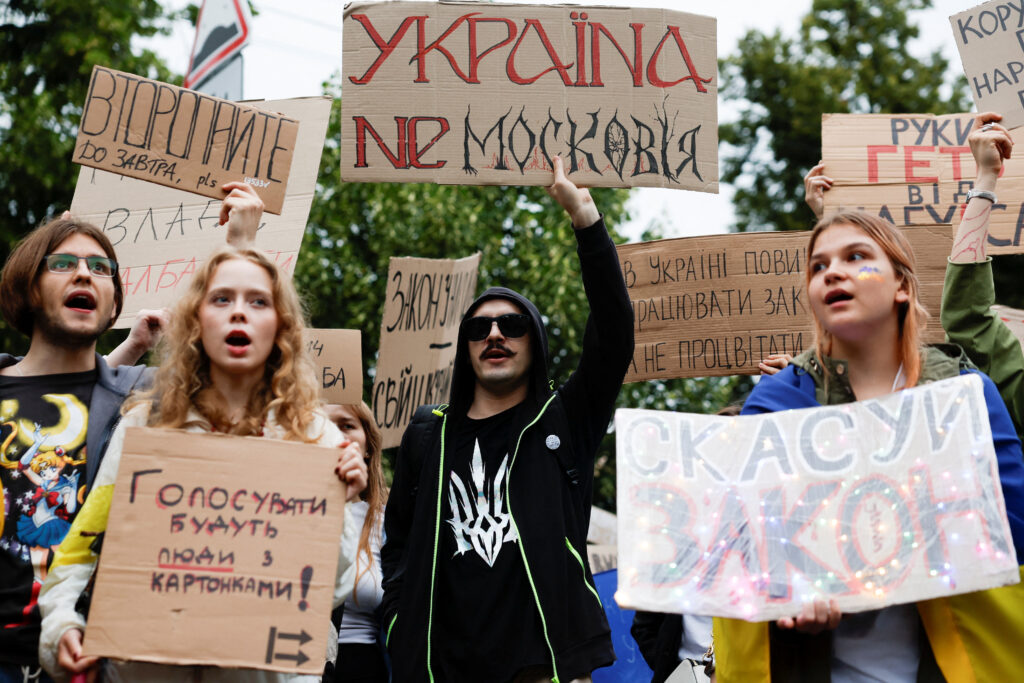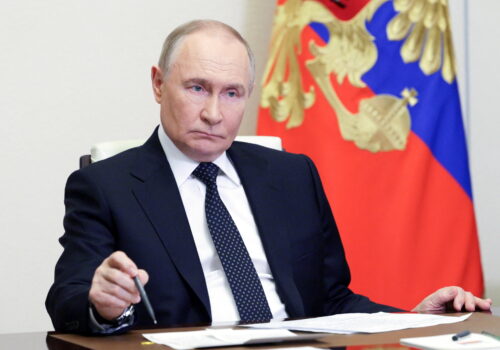The Ukrainian Parliament voted last week to reverse controversial legislative changes that threatened to deprive the country’s anti-corruption institutions of their independence. This apparent U-turn by Ukrainian President Volodymyr Zelenskyy came after thousands took to the streets in Ukraine’s first major public protests since the onset of Russia’s full-scale invasion more than three years ago.
The scandal surrounding efforts to subordinate Ukraine’s anti-corruption agencies to the politically-appointed Prosecutor General was part of a broader trend that has sparked concerns over potential backsliding in the country’s reform agenda. Additional factors include the failure to appoint a new head of the Economic Security Bureau of Ukraine, investigations targeting prominent anti-corruption activists, and alleged attempts to undermine the work of other key institutions like the High Qualification Commission of Judges.
The recent wave of nationwide protests in defense of the country’s anti-corruption reforms served as a timely reminder that Ukraine’s democratic instincts remain strong, even amid the horrors of Russia’s invasion and the escalating bombardment of Ukrainian cities. The message to the government was clear: Ukrainian society is determined to defend the democratic progress secured over the past eleven years since the 2014 Revolution of Dignity. This includes safeguarding the independence and integrity of the watchdog institutions established in the wake of the revolution.
Stay updated
As the world watches the Russian invasion of Ukraine unfold, UkraineAlert delivers the best Atlantic Council expert insight and analysis on Ukraine twice a week directly to your inbox.
The readiness of Ukrainians to rally in support of the country’s anti-corruption reforms undermines efforts by detractors to portray today’s Ukraine as hopelessly corrupt and unworthy of international support. In reality, Ukrainians are more committed than ever to the democratic values that have shaped Ukraine’s national journey throughout the turbulent past few decades.
Meanwhile, the anti-corruption bodies established since the 2014 revolution are evidently effective enough to target senior figures close to Ukraine’s political leadership. They have also won the respect of the country’s vibrant civil society and are regarded as an important element of Ukraine’s reform agenda by much of the population.
It should come as no surprise that so many ordinary Ukrainians view the fight against corruption as crucial for the country’s future. After all, efforts to improve the rule of law are widely recognized as central to Ukraine’s European ambitions.
Over the past decade, anti-corruption reforms have helped the country achieve a series of key breakthroughs along the path toward EU integration such as visa-free travel, candidate country status, and the start of official membership negotiations. Ukrainians are well aware of the need to maintain this momentum, and remain ready to pressure the government on anti-corruption issues if necessary.
Eurasia Center events

Since the Revolution of Dignity, Ukraine’s reform progress has been closely monitored and fiercely guarded by Ukrainian society. The Ukrainian public combines a strong sense of justice with a readiness to act in order to preserve fundamental rights. They are backed by a seasoned and self-confident civil society sector, along with an independent media ecosystem that refuses to be silenced.
Over the past decade, Ukraine’s ability to adopt and implement reforms has often depended on a combination of this grassroots domestic pressure together with conditions set by Ukraine’s international partners. These two factors remain vital in order to keep the country on a pathway toward greater Euro-Atlantic integration.
Some skeptics have suggested that the fight against corruption is a luxury that Ukraine cannot afford while the country defends itself against Russia’s ongoing invasion. Such thinking is shortsighted. Faced with a far larger and wealthier enemy like Russia, Ukraine must make every single penny count.
In peacetime, corruption can undermine the business climate and hinder the country’s development. The stakes are far higher in wartime, with corruption posing a threat to Ukraine’s national security. It is therefore crucial to increase scrutiny and reduce any graft to an absolute minimum. Meanwhile, the long-overdue reform of specific sectors such as the state customs service and tax administration can generate important new revenues that will provide a timely boost to the Ukrainian war effort.
The success of Ukraine’s recent protest movement is encouraging and underlines the country’s status as a resilient young democracy. At the same time, it is too early to declare victory.
In the coming weeks, Ukrainian civil society and the country’s international partners will expect to see a new head of the Economic Security Bureau of Ukraine appointed, along with the appointment of four Constitutional Court judges who have passed the international screening process. Efforts to pressure civic activists and the country’s independent media must also stop.
Speaking on August 1, Russian President Vladimir Putin made a point of attacking Ukraine’s anti-graft agencies. He obviously recognizes that strong anti-corruption institutions serve as important pillars of Ukraine’s long-term resilience and represent an obstacle to Russia’s plans for the conquest and subjugation of country. The Kremlin dictator’s comments should be seen as further confirmation that Ukraine’s anti-corruption reforms are more vital than ever in the current wartime conditions.
Olena Halushka is a board member at AntAC and co-founder of the International Center for Ukrainian Victory.
Further reading
The views expressed in UkraineAlert are solely those of the authors and do not necessarily reflect the views of the Atlantic Council, its staff, or its supporters.

The Eurasia Center’s mission is to enhance transatlantic cooperation in promoting stability, democratic values, and prosperity in Eurasia, from Eastern Europe and Turkey in the West to the Caucasus, Russia, and Central Asia in the East.
Follow us on social media
and support our work
Image: Protesters hold placards during a rally ahead of a vote in parliament on Thursday, in which lawmakers will consider restoring the independence of two key anti-corruption agencies, amid Russia's attack on Ukraine in Kyiv, Ukraine. July 30, 2025. (REUTERS/Thomas Peter)




